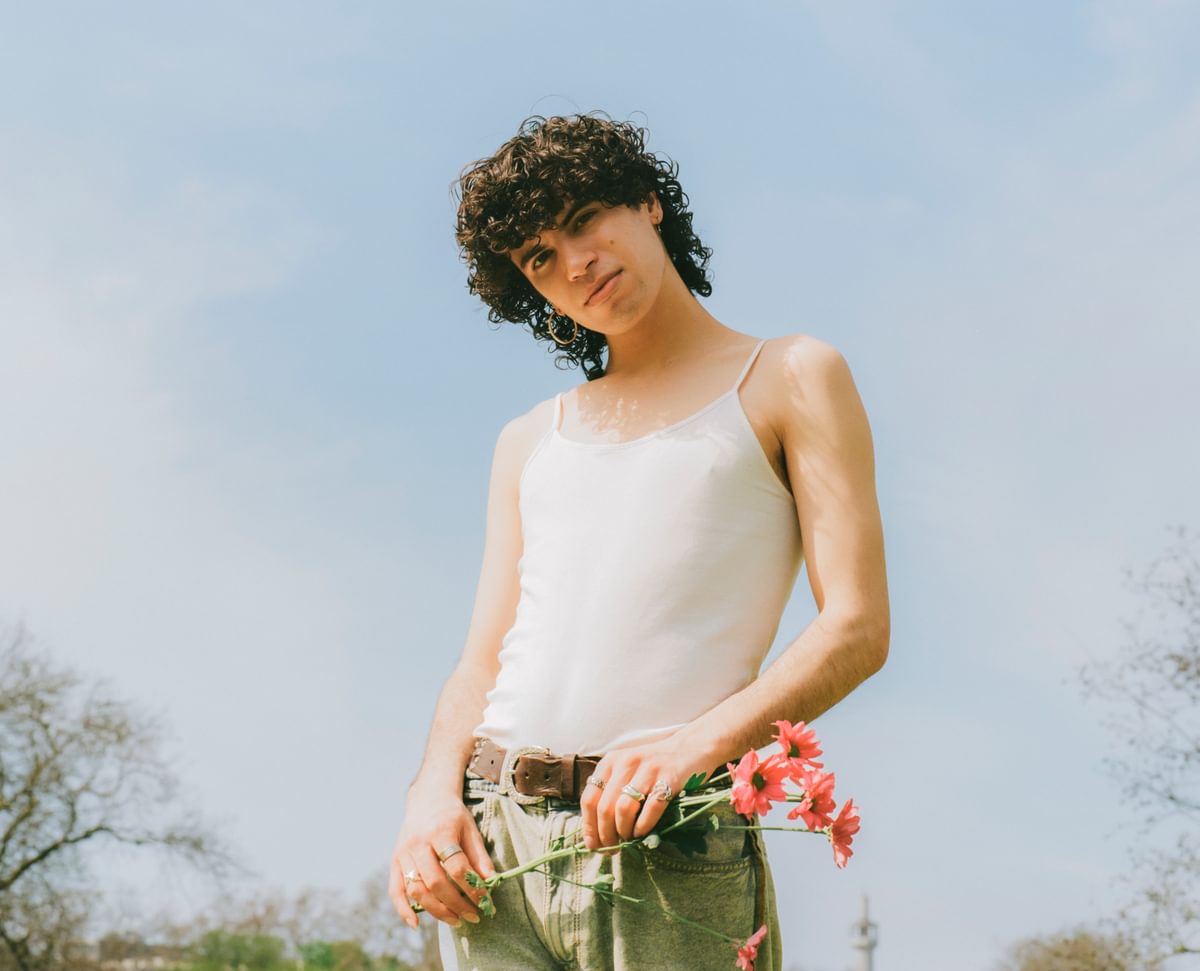
Jacob Alon’s return to enchantment
Merging raw lyricism with haunting melodies, Scottish songwriter Jacob Alon transforms childhood enchantment and heartbreak into stirring, soul-lit songs.
When Jacob Alon thinks back to their childhood, they remember finding comfort through creating magic out of the mundane. Growing up as a kid on a housing estate in Fife, Scotland, meant that if you wanted to escape, you had to do so by crafting it yourself.
“I think the world of fantasy and mysticism always drew me in,” Alon tells me. “I was interested in the creatures of the earth, and telling little stories.” The woods behind the estate became the backdrop to many of their witchy memories (“I remember always making soups and perfumes, I was obsessed with magic and spells and witches”) and was also their first taste of storytelling. “I remember, in school, I recruited this team of mages, and we had this entire story arc that I felt so enraptured by,” Alon – who uses they/them pronouns – explains. “It was rooted in tragedy. My best accomplice turned against me and became my enemy. We’d go through this routine every lunchtime in primary school. It felt like this Oscar-winning performance, when the story reached its peak intensity and all the drama unfolded. I remember, instead of just appreciating it for what it was and letting it be, I’d be like, “Right, again, same moment,” and we’d replay it like five times, just to bask in it.”
But after a childhood of pure curiosity, escapism, and wonder, Alon completely shut that version of themselves down in an attempt to fit in with the world around them. “I became this very skeptical, narrow-minded person. I was so fundamental in building an understanding of the world around me, and I ended up rejecting everything mystical, everything spiritual, and kind of turning away from the emotional side of my heart to protect it.”
Protecting their heart meant shifting the focus away from music entirely, especially after they didn’t feel supported to pursue musical endeavours from their family (“It [music] was like my oldest friend that I neglected but who stuck around anyway”). As a way to keep up appearances and appease everyone else, they started — and left — university twice, the first time in medicine and the second in theoretical physics. Despite Alon wanting to lean into their left brain, their creative side wasn’t slipping away. “Although a lot of the pressure was external, but honestly, most of it was internal,” they admit. “I just never believed I was good enough to do the things that brought me joy. I felt like, to deserve that joy, I had to be exceptional. I had to find a way to impact the world in the most moral, meaningful way. I’ve just never felt like I’m enough. I still don’t. I think that’s why, especially at first, I tried to be a doctor. It was like, “If I have any abilities at all, I should use them for maximum good. But it came at the cost of my own happiness.”
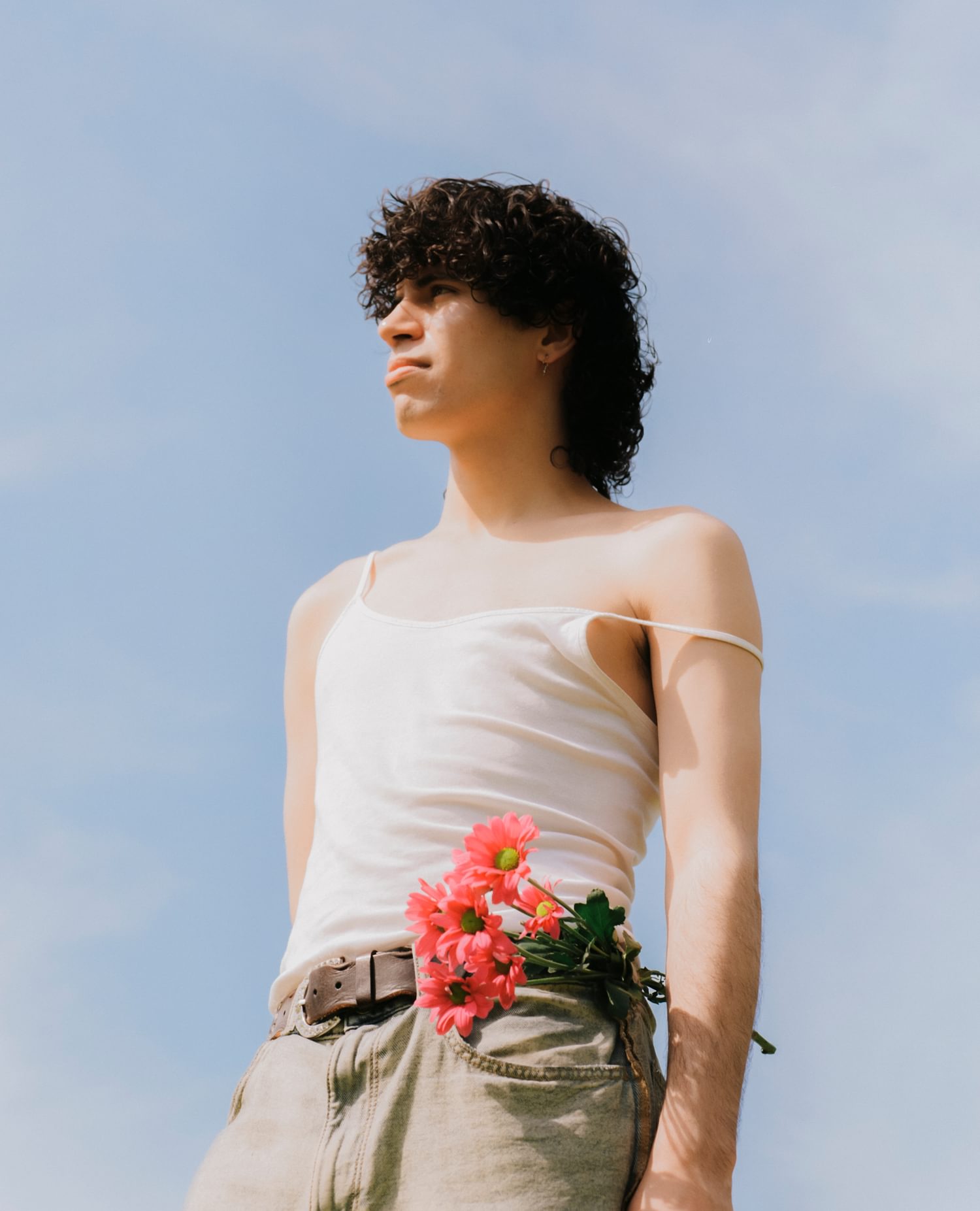
Dropping out forced them to realise that giving up their own autonomy for the sake of the happiness of others was no way to live, even if they love being able to help. “I love sharing something I love and having people tell me it’s helped them,” they say. “That’s more rewarding than any ward round I did. I even performed surgery on someone once — that was something I dreamed of doing. It was surreal. It was beautiful. I still treasure that. Now I get to operate on my own heart through music.”
For Alon, longing is the thread that connects In Limerence, their forthcoming debut album, together — whether that is the longing to exist in past moments, to reconnect with someone, or to get back to the person they once were. Although much of the record is shaped and coloured by existing within the grey area of limerence, it’s longing that helped them reconnect not just with some of the subjects of the songs, but with themselves.
“Now I feel like that thread has opened up again,” they admit. “It's frayed a bit more, in a beautiful way. I’ve reinvited the feelings of magic back into my life, not in a way where I’m closing off my heart as much anymore. Maybe I still am in some ways, but I feel more connected to the inner child. Even though I’m maybe not putting my faith in something arbitrary, I’m inviting those feelings of wonder I had back then. I feel like I’m always longing to reconnect with that part of me, especially in creative stuff, that came so easily when I was a kid.”
Although it's an entirely instrumental track, “Home Tapes” captures Alon’s own journey to reconnecting with themselves and their past, as heavy as it was at times, to make peace with it. Juxtaposed with the instrumental is audio from tapes plucked straight from Alon’s childhood. While helping their mum move following a dissolution of a relationship, they unearthed unlabelled VHS tapes which were discarded, and stored in a shoebox in the back of a cupboard. Alon had them digitised and binged the footage over a three-day period. "It was footage from three years before I was born to about when I was five," they tell me. "It was birthdays and special moments that had been captured and preserved in this nostalgic frame. My mum had me when she was really young, so I got to see a bit of her life before she was shackled by children. Then I got to see my inner child face to face. I had so many conceptions about who I was as a child — a lot of them quite self-hating and negative. I think those distortions and wounds probably rattle into the ways my heart loves now.”
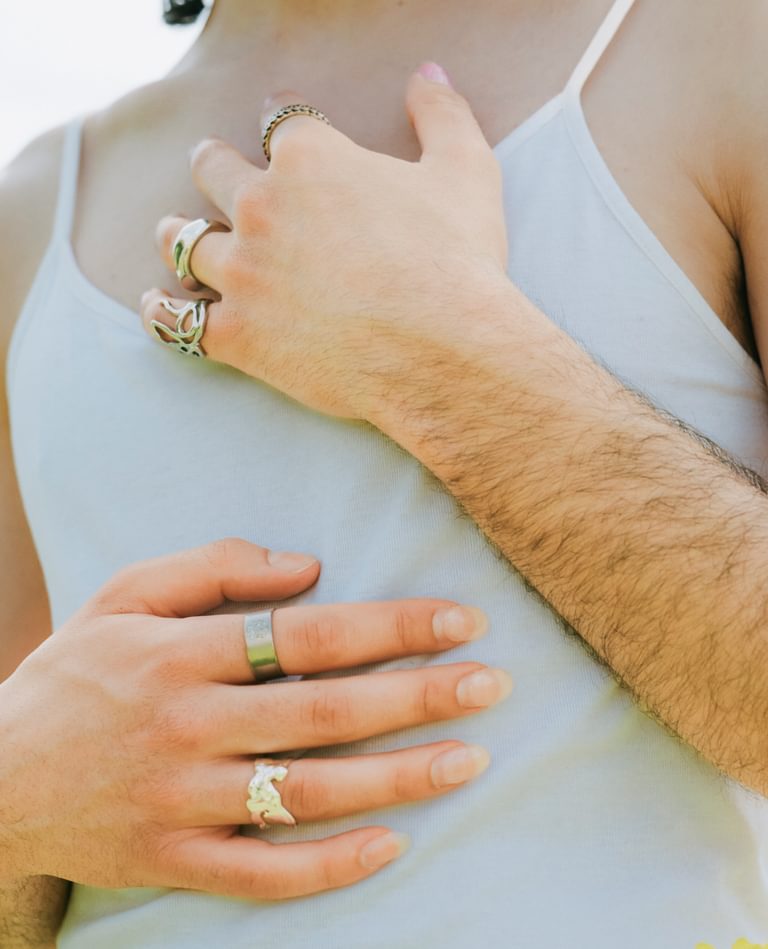
The path that led to the making of In Limerence, Alon describes, is almost like branches of a tree that emerge from the root. After finishing the home tapes, Alon had a similar mourning feeling when your favourite TV show ends and you realise you’ll never experience those characters again. “I felt those familiar feelings, and then I realised — no, that’s me. That’s within me. That’s contained within all the incarnations and layers of my tree trunk, like the rings — you could count them. It’s all in there.”
Those personal anecdotes are trickled throughoutIn Limerence, almost serving as a kaleidoscope of Alon’s memories and emotions collaged together. Even during the happy, funny, incidental moments, there were painful moments brought up throughout the making of the record — things that only Alon and a handful of other people in their biological family could understand. “Home Tapes,” in particular, was a watershed moment for Alon and their producer, Dan Carey. Making it was completely improvised (“He put the samples from all these moments on a MIDI keyboard so he could trigger them, and I just sat and played guitar.”).
When it ended, it felt like they had travelled back in time and returned. “I was on the floor and we played it back, and I wept,” Alon says. “It felt like there had been so much processing of things I’d never properly processed. I think memory is such a key theme of this record. Memory can be more than just a chronological retelling of events — captured in moving images and sounds in your mind. You can remember things through feelings in your body. You can remember fear simply as a stress response, without the event attached to it. I think a lot of the wounds and memories from that era were contained within the pain I feel now — the brokenness in my love, or certain things I do now, even without knowing the context. Going back and finding that context was so vital. It helped me see what felt like a bigger picture. When I sent that track to my mum the day after we made it, she sent back one line. She said, “It was like a dream I didn’t want to wake up from.” And that, to me, summarizes the whole feeling of the record.”
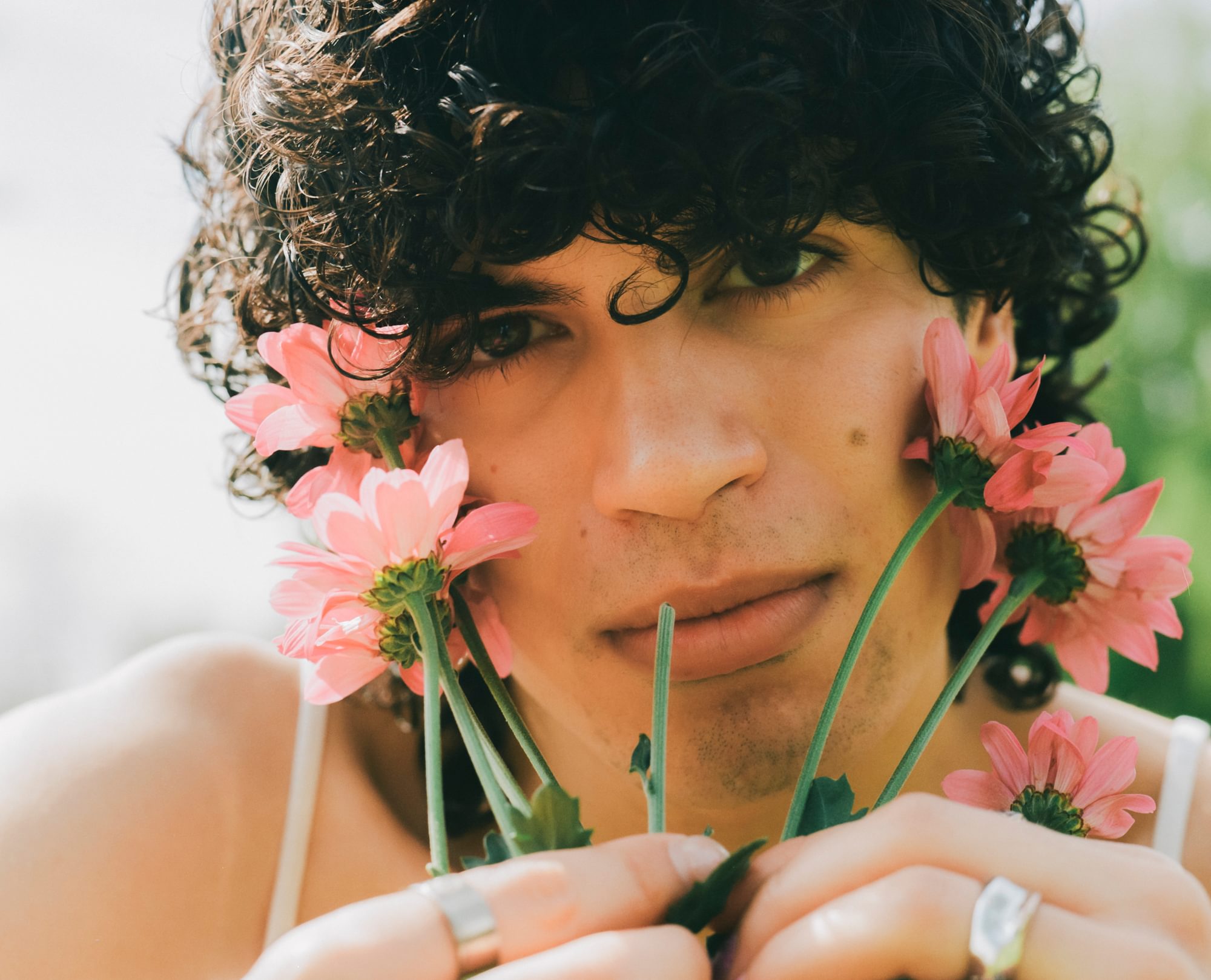
While dipping back into their past was a lesson in reconnection with themselves, it also meant reconnecting with formative people in Alon’s life. On “August Moon,” a standout track and the oldest song on In Limerence, Alon sings of a “disastrous holiday” they went on to Greece, right after high school that was full of loud club music and sickly sweet drinks. Worse, it became a trip that quite literally ripped them and their friend apart.: “It was one of those classic 'lads holidays,' we went to Malia, which, looking back, is wild because I’ve never really fit in in that kind of party setting. I always felt like such an outsider.
"At the time, I was completely in love, or in limerence, with my best friend. We had this really intense, unspoken connection. Things had happened between us, but there was no language for it — no real communication. That trip kind of imploded emotionally. He had fallen hard for a girl who didn’t love him back. I was in love with him, so the whole thing was just this tangled mess of heartbreak and confusion.”
One night on the Malia strip, they found each other and had a rare, honest moment of connection, so much so that the uncomfortable rawness forced the two teens to leave that emotional space and go on an adventure. “We were sneaking around, climbing fences, jumping into private pools, being young and reckless.” Alon still isn’t sure who they were, but one night they ended up in a pool which belonged to some sort of organized crime group. “Let’s just say they were not happy to find us there,” Alon recounts. Quickly, things escalated — the two teens were caught, beaten, and stomped on. Alon’s friend managed to pull them off, allowing them to slip away. “But somehow, they found our hotel and then extorted us for hundreds of euros. My friend had his face cut open with broken glass and needed stitches. I remember lying on the hospital bed, semi-conscious, holding his finger as he was being stitched up. It was brutal.”
For years after, Alon had nightmares that forced them to relive that moment — where they were finally open and honest with the person they cared for, and the universe separated them once again. “All that trauma was layered on top of this deep emotional pain — this unspoken love. When I finally wrote ‘August Moon,’ I stopped having them [nightmares]. It was like the song helped me process it all and put it somewhere. When my friend heard it later, he actually reached out. It felt like something that had disconnected us had finally reconnected us again. It’s wild to look back and see how a song can become that kind of vessel — for pain, for healing, for closure. That’s the beauty in transforming something so heavy into something meaningful.”
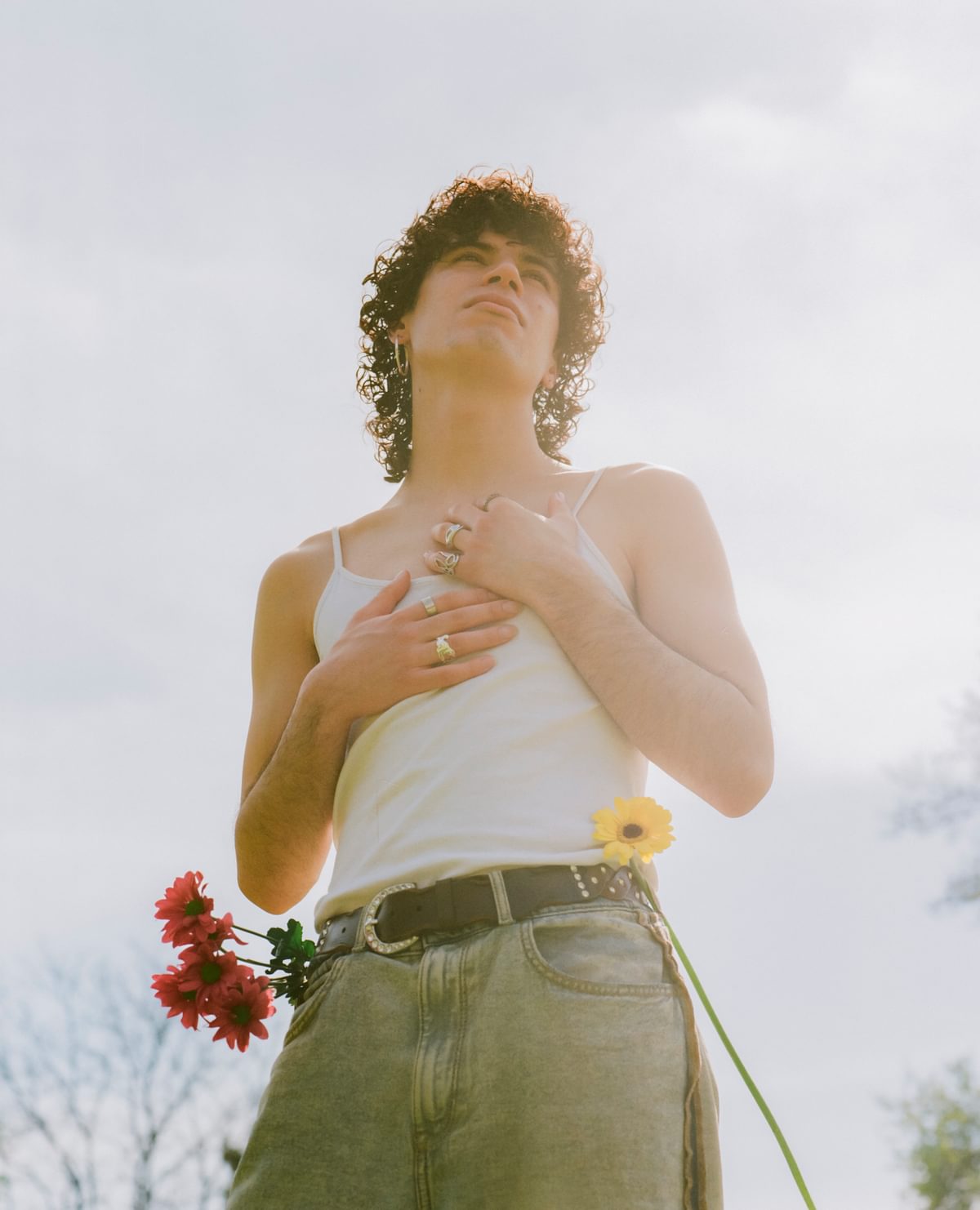
With the record almost out, Alon feels like this process of reconnecting to themselves has made their feet exist in two different places: the past and the future. “It feels like something is concluding, and it feels like lots of other things have opened,” they admit. “It feels like change. In a scary way, I don’t know what’s next.” For someone who, at one point, was studying medicine and operating on a human body, releasing a debut record is a feat in itself.
Now, Alon views their own songwriting as a way of poking and prodding around their heart. “[Making In Limerence] has opened so many windows of being able to understand a lot of the things in my heart. [...] I even feel the change in myself, even just by exploring it and trying to look inwards to the parts of me that are wounded, like that small child. The word ‘limerence’ describes something I, for a long time, called love, but I think it's a reflection of the woundedness within you. It's longing for a ghost. There is no limerence without that small child not being able to make sense of their pain and their sense of abandonment.”
Get the Best Fit take on the week in music direct to your inbox every Friday

Lorde
Virgin

OSKA
Refined Believer

Tropical F*ck Storm
Fairyland Codex




